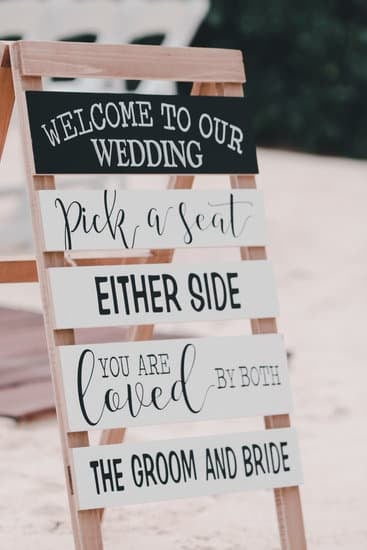Can any ring be a wedding ring? The traditional concept of wedding rings has evolved over time, giving rise to new trends in choices. This has brought up the question: Can any ring be a wedding ring? Wedding rings hold great symbolism in various cultures and modern society, with deep emotional and sentimental value. Exploring the possibilities of what constitutes a wedding ring can lead to a better understanding of the significance behind this cherished tradition.
Wedding rings have been traditionally associated with specific materials such as gold, silver, and platinum. These materials carry cultural and historical significance, but contemporary designs have introduced alternative materials like titanium and tungsten. The versatility and durability of these modern materials have contributed to the evolving landscape of wedding ring choices. Additionally, customization options have opened up the potential for personalizing non-traditional rings for wedding purposes, reflecting individual beliefs and values.
Cultural differences and personal preferences also play significant roles in determining wedding ring choices. Understanding these factors is crucial when considering the meaning behind a wedding ring.
Debunking common misconceptions about what constitutes a real wedding ring sheds light on the idea that any ring can be a wedding ring with the right significance attached to it. As we delve into this discussion, it becomes clear that the evolution of wedding rings offers diverse opportunities for meaningful expressions of love and commitment.
The Symbolism of Wedding Rings
Exploring Cultural Significance
Wedding rings hold a deep symbolism in various cultures around the world. From the ancient Egyptians to modern-day Western societies, the circular shape of the ring has been seen as a symbol of eternity and unending love.
In some cultures, the exchange of wedding rings is accompanied by rituals and ceremonies that further emphasize their significance. For example, in Hindu weddings, the groom places a ring on the bride’s finger to symbolize their unity as one soul in two bodies.
Modern Significance
In contemporary society, wedding rings continue to hold immense emotional and sentimental value. They serve as constant reminders of the commitment and love shared between two individuals. The act of exchanging rings during a wedding ceremony signifies the couple’s promise to be faithful and devoted to each other for eternity. Additionally, wearing wedding rings can also represent a sense of pride in one’s marriage and serve as a visual symbol of unity within a partnership.
The Emotional Value
Beyond their symbolism, wedding rings are also highly valued for their emotional significance. The exchange of rings not only marks the beginning of a new chapter in a couple’s life but also creates lasting memories that are treasured throughout their years together. As such, understanding the deeper meaning behind wedding rings can greatly impact individuals’ choices when it comes to selecting these symbols for their own marriages.
Can any ring be a wedding ring? No-because true wedding rings carry this emotional weight and promise along with them.
Traditional Wedding Ring Materials
Wedding rings have traditionally been crafted from materials such as gold, silver, and platinum. These materials have been used for centuries due to their durability and symbolism. In many cultures, these traditional materials hold significant value and are believed to symbolize the eternal and unbreakable bond between a couple. Gold, in particular, is associated with wealth and prosperity, making it a popular choice for wedding rings.
The use of traditional materials in wedding rings can be traced back to ancient civilizations, where they were seen as precious and valuable metals. For example, in ancient Egypt, couples exchanged rings made of braided reeds or leather. Over time, these materials evolved into the precious metals we use today. Similarly, in Roman times, iron was considered a symbol of strength and permanence, which led to the tradition of using iron rings for weddings.
In addition to their historical significance, traditional wedding ring materials are also valued for their timeless appeal. Gold, silver, and platinum are classic choices that never go out of style. The elegance and luster of these metals make them a popular option for couples who prefer a more traditional and classic look for their wedding rings.
- Gold
- Silver
- Platinum
Contemporary Wedding Ring Materials
When it comes to contemporary wedding ring materials, there has been a notable shift in trends and preferences among couples. While traditional materials such as gold, silver, and platinum have long been the go-to choices for wedding rings, many are now opting for more modern options. Materials like titanium, tungsten, and stainless steel are gaining popularity due to their unique qualities and aesthetic appeal.
Rising Popularity of Alternative Materials
One of the main reasons behind the increasing popularity of alternative materials for wedding rings is their durability. Titanium, for example, is known for being exceptionally strong and scratch-resistant, making it a practical choice for those with active lifestyles. Tungsten is another favorite due to its remarkable resilience and ability to maintain its luster over time. Additionally, contemporary metals like stainless steel offer a sleek and modern look that appeals to many couples seeking non-traditional options.
Versatility and Durability
Contemporary wedding ring materials offer a level of versatility that traditional metals may not provide. Alternative materials can be easily molded into intricate designs and shapes, allowing for more unique and personalized wedding rings. Moreover, these modern materials are often more affordable than their traditional counterparts while still offering the same level of quality and elegance. The combination of durability, versatility, and affordability has made contemporary wedding ring materials an attractive choice for couples looking to break away from tradition.
The Significance of Modern Wedding Ring Materials
While some may question whether any ring can be a wedding ring, the significance of modern materials in the context of marriage should not be underestimated. Just like traditional metals, alternative materials can carry deep emotional value when exchanged as symbols of love and commitment. As the concept of weddings continues to evolve, so too does the meaning behind the rings exchanged during these ceremonies.
Customization Options
When it comes to wedding rings, many couples want something that is unique and personalized to represent their love and commitment. While traditional wedding ring materials like gold, silver, and platinum have been the go-to choices for generations, there is now a rising trend in customizing non-traditional rings for wedding purposes. This leads us to the question: Can any ring be a wedding ring?
The answer to this question is yes, any ring can become a wedding ring with the right customization. The beauty of modern jewelry design is that it allows for almost limitless options when it comes to personalization. Whether it’s adding engravings, incorporating birthstones, or choosing alternative materials like titanium or tungsten, couples today have the freedom to create wedding rings that truly reflect their unique love story.
Customizing non-traditional rings for wedding purposes also opens up possibilities for couples who may not resonate with the cultural or historical significance of traditional wedding ring materials. By choosing rings that are meaningful to them personally, couples can infuse their own values and beliefs into their wedding rings, creating a symbol of their commitment that is deeply personal and reflective of their relationship.
In today’s diverse and ever-evolving society, the concept of what constitutes a wedding ring has expanded to include a wide range of options. From vintage heirlooms to contemporary designs made from unconventional materials, what truly makes any ring a wedding ring is the intention and significance behind it.
As long as a couple places value and meaning on a particular ring as a symbol of their love and commitment, then that ring can rightfully be considered a wedding ring.
Cultural and Personal Factors
When it comes to choosing a wedding ring, cultural and personal factors play a significant role in the decision-making process. Different cultures around the world have their own traditions and preferences when it comes to wedding rings, influencing the materials, designs, and even the wearing customs of these symbolic pieces of jewelry. For example:
- In Western cultures, gold and silver are popular choices for wedding rings due to their traditional significance and timeless appeal.
- In Eastern cultures like in India, brides often receive intricate designs made of materials like platinum or even gemstones as part of their wedding jewelry.
- In some African cultures, couples exchange simple bands made of durable materials like stainless steel or titanium to symbolize strength and endurance in marriage.
Additionally, personal factors such as individual preferences, lifestyle, and beliefs also play a crucial role in choosing a wedding ring. Some people may prefer non-traditional materials like tungsten or carbon fiber due to their durability and low maintenance. Others may opt for unique designs that reflect their personalities or interests, such as incorporating engravings of meaningful symbols or words.
Ultimately, when it comes to selecting a wedding ring, the most important consideration is the symbolism and emotional value attached to the ring. While there are traditional choices for materials and designs based on cultural practices, any ring has the potential to become a wedding ring when it holds significance for the couple getting married.
Mythbusting
Customizing a ring to become a wedding ring is a common practice, and it has given rise to various misconceptions about what constitutes a “real” wedding ring. Many people wonder whether any ring can be a wedding ring, and the answer is yes. The significance of a wedding ring lies in the meaning and intention behind it, rather than specific characteristics of the ring itself. In fact, personalized rings or unconventional choices can hold deep emotional value for couples.
One common misconception is that only traditional materials like gold or platinum can be used to make wedding rings. While these materials have cultural and historical significance, modern couples are increasingly opting for alternative materials such as titanium, tungsten, and stainless steel.
These contemporary options offer durability and versatility while allowing for unique designs that reflect the personal style of the couple. As long as a ring is chosen with the intention of symbolizing love and commitment, it can indeed serve as a meaningful wedding ring.
It’s also important to debunk the myth that only certain styles or designs qualify as wedding rings. In reality, any type of ring can become a wedding band when it is imbued with personal significance and represents the union between two individuals.
Whether it’s an heirloom passed down through generations, a customized design that reflects shared interests, or even non-traditional materials like wood or silicone, what truly matters is the emotional connection associated with the ring as opposed to its outward appearance.
Conclusion
In conclusion, the traditional concept of wedding rings has evolved significantly over time, allowing for more diverse and personalized choices. The symbolism of wedding rings holds great importance in various cultures and modern society, emphasizing the emotional and sentimental value attached to these pieces of jewelry. While traditional materials such as gold, silver, and platinum continue to be popular choices, contemporary materials like titanium and tungsten have gained traction due to their versatility and durability.
The customization options for wedding rings are endless, allowing any ring to be personalized for the special occasion. Cultural differences and personal preferences play a significant role in wedding ring choices, emphasizing the need to consider individual beliefs and values when making this decision. Moreover, it’s important to debunk common misconceptions about what constitutes a real wedding ring – ultimately, any ring can be a meaningful wedding ring with the right significance and intention behind it.
As readers consider their own wedding ring choices, it’s crucial to reflect on the significance of this symbol that represents love, commitment, and partnership. Whether opting for a traditional or non-traditional design, what truly matters is the meaning attached to the ring. With proper understanding and intentional choice-making, any ring can indeed become a treasured wedding ring that symbolizes a lifetime of love and devotion.
Frequently Asked Questions
Can You Use Any Ring as a Wedding Ring?
Not necessarily. While any ring can be used as a wedding ring in a symbolic sense, traditional wedding rings are typically made from precious metals like gold or platinum. These rings are also often adorned with diamonds or other precious gemstones.
Can Anything Be a Wedding Ring?
Technically, yes, anything can be used as a wedding ring if a couple agrees on its symbolism and meaning. Some couples may choose to use non-traditional items such as tattooed bands or heirloom items with personal significance.
Can Any Ring Be a Wedding Ring for Men?
Absolutely, men can wear any type of ring as a wedding ring if they so choose. While traditional men’s wedding rings are often simpler in design compared to women’s rings, there is no rule stating that they must be a certain style or made from specific materials.
Men have the freedom to choose any ring that holds meaning for them and symbolizes their commitment to their partner.

I have been involved in marriages for over 20 years helping couples and singles understand more about them.





